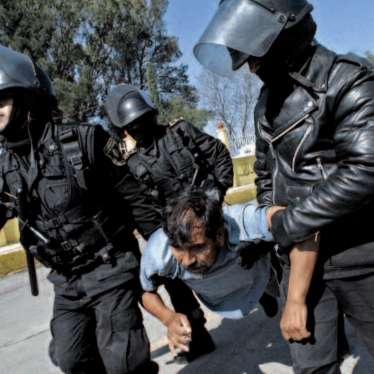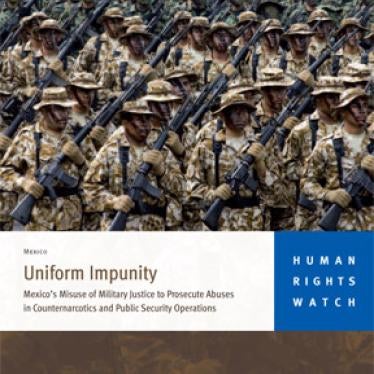Dr. Plascencia Villanueva
Comisión Nacional de los Derechos Humanos de México
México, D.F., México
Dear Dr. Plascencia Villanueva:
I am writing on behalf of Human Rights Watch to congratulate you on your recent appointment as president of the National Human Rights Commission (CNDH), and to respectfully urge you to promote the reforms necessary to ensure that military abuses against civilians are investigated, prosecuted, and sanctioned by Mexican civilian authorities. We are confident that, with the right leadership, the commission can use its broad mandate and considerable resources to play an important role in ensuring accountability in Mexico.
We would like to commend you for the proposal you made to Congress yesterday, requesting legal reforms to sanction public officials that refuse to accept and/or comply with CNDH recommendations. In fact, in our 2008 report evaluating the commission's performance, we recommended that when the CNDH finds that state actors are failing to implement a recommendation, it should actively press these actors to fulfill their obligations to remedy abuses. We specifically recommended that the CNDH "advocate for administrative sanctions to be imposed on officials who fail to address the human rights violations it documents," and that the commission "document and publicly denounce government officials' failure to remedy abuses in accordance with its recommendations."[1] This is precisely the sort of leadership role that the CNDH needs to take.
In terms of military abuses, the commission has provided detailed and authoritative information on specific human rights violations by the military. Between September 2007 and the present, the CNDH has issued dozens of recommendations to the military after documenting human rights abuses committed by officers against civilians. The documented cases of abuse include rapes, killings, torture, and arbitrary detentions. As a consequence of some of these reports the Ministry of Defense has even paid monetary compensations to victims and their families, but it has routinely failed to hold those responsible for the abuses accountable.
A serious flaw of these recommendations is that the commission has routinely recommended military authorities investigate themselves, despite the fact that Mexican military tribunals are neither independent nor impartial. The secretary of defense directs the armed forces and the military justice system, military judges lack security of tenure, and there is virtually no review by civilian authorities of military decisions that affect the rights of civilian victims. Furthermore, the military justice system as a whole is secretive and opaque.
The consequence of exercising military jurisdiction over these cases has been almost absolute impunity for transgressors. According to information provided to Human Rights Watch by the Interior Ministry, during the three years of the Calderón administration, military courts have only convicted one military officer for a human rights abuse: a soldier who was sentenced to 9 months in prison for opening fire at a military checkpoint and killing a civilian.[2]
It has recently come to our attention that the CNDH is working on a report on human rights abuses by members of the Mexican military. We are encouraged to hear the commission is planning to "establish some strategies and courses of action to prevent violations of human rights by members of the military," as has been reported in the press.[3]
We believe your upcoming report on military abuses offers a unique opportunity to advocate for systemic change that could address this lack of accountability. This is especially true in light of the recent binding ruling by the Inter-American Court of Human Rights, which ordered Mexico to modify its Code of Military Justice to comply with its international obligations. In the case Radilla Pacheco v. Mexico, the court concluded unequivocally that "under no circumstances can military jurisdiction be applied" in cases where the military violates the human rights of civilians.[4]
Based on the above, we recommend you propose the following reforms in your forthcoming report[5]:
- Modify article 57 (II) of the Code of Military Justice so that it explicitly states that at a minimum cases of alleged serious human rights violations committed by members of the armed forces against civilians, including enforced disappearances, torture and other ill treatment, killings, arbitrary detentions, and rapes, may not be prosecuted by the military justice system and must be immediately sent to civilian state or federal prosecutors.
- Instruct military authorities to cooperate fully with civilian prosecutors in the investigation and prosecution of military abuses against civilians.
- Ensure that military judges and magistrates have security of tenure by establishing a specific period of time during which they will serve in their posts and clear reasons and mechanisms for their removal.
- Ensure that decisions adopted by military tribunals are subject to comprehensive review by civilian authorities by, for example, appointing independent civilian judges to the Supreme Military Tribunal, or allowing for substantive review of military decisions by federal courts.
In addition, to strengthen the commission's effectiveness in bringing about the necessary changes in Mexico, we urge you to thoroughly follow up on these recommendations and actively press government authorities to adopt them.
We look forward to reading the commission's report and working with you throughout your term.
Sincerely,
José Miguel Vivanco
Executive Director
Americas Division
Human Rights Watch
[1] For additional information on these recommendations, see Human Rights Watch, "The National Human Rights Commission: A Critical Assessment," February 2008, https://www.hrw.org/en/reports/2008/02/12/mexico-s-national-human-rights-commission.
[2] Ministry of Interior, Oficio 100-243, October 20, 2009; and Human Rights Watch, Letter in Response to Interior Minister of Mexico, Fernando Francisco Gomez-Mont Urueta, November 20, 2009, both documents are available at https://www.hrw.org/en/news/2009/11/20/letter-response-interior-minister-....
[3] Ruth Rodríguez y Nurit Martínez, "CNDH alista informe sobre abuso militar," El Universal, January 22, 2010.
[4] Corte Interamericana de Derechos Humanos, Caso Radilla Pacheco vs. México, sentence from November 23, 2009.
[5] For additional information on these recommendations, see Human Rights Watch, "Uniform Impunity: Mexico's Misuse of Military Justice to Prosecute Abuses in Counternarcotics and Public Security Operations," April 2009, https://www.hrw.org/en/reports/2009/04/28/uniform-impunity.








